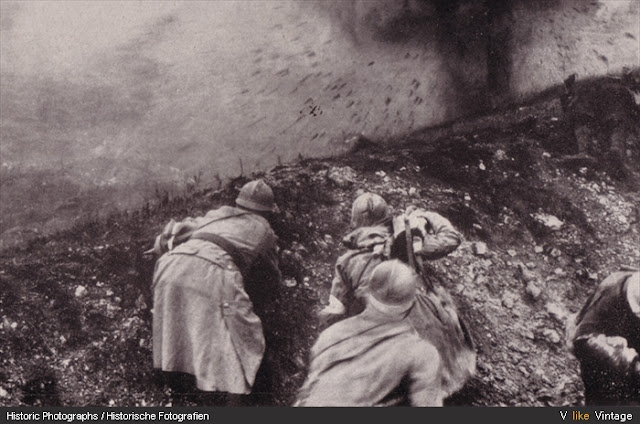 |
| French troops preparing to counterattack at Verdun |
"On est puceau de l'horreur, comme on l'est de la volupté"
L.F. Celine
Gabriel Chevallier
wrote a book that nobody wanted to read, about a moment in history nobody
wanted to be reminded of and about a feeling everybody was ashamed of.
His war book “La Peur”
(Fear) is not one of the more famous books coming out of la “Grande Guerre”.
Chevallier’s name for instance has not the ring of an Ernst Junger or a Henri
Barbusse, a Robert Graves or a Ford Maddox Ford, those better known writers who
have attempted to capture the horrors of the trenches of World War I.
I say attempted,
because no words can ever bring home the sheer terror soldiers from all sides experienced
in one of the most scandalous episodes of human history. Chevallier’s book
however comes close…
Gabriel Chevallier ( 3
May 1895 – 6 April 1969 ) is better known for his satirical novel Clochemerle.
It brought him commercial success and allowed him to live from his pen. “Fear”
however was a book which had always been very difficult to find, until recently,
when several editions appeared in the wake of commemorations of the war of
14-18. “Fear” never had the success it deserved. It appeared rather late, only
in 1930, 12 years after the hostilities ended. Then, from 1939 on, the book was
forbidden for obvious demoralizing reasons and then in the fifties, when it
became available again, the public was a bit weary of wars and turned to other
topics.
“La Peur” is an
autobiographic book. It relates Chevallier’s experiences at the frontline
during the first World War. The narrator, his thinly disguised alter ego, Jean
Dartemont, survives the four year war, but does not come out of this hell unscathed.
A most shocking thing,
the writer insists on, is that the enemy for the common soldiers are not the
Germans. Dartemont will come face to face with enemy soldiers only twice in his
four year of battle experience. The real enemy in the trench war is invisible. And
this makes it so terrible. The enemy comes in the shape of constant bombing, of
lethal grenade rains, of invisible snipers, of mines that maim horribly, of gasses
that kill slowly, of tunnels that cave in. Rarely is there a face to face
battle. Worse than the Germans, for the front soldier, is one’s own officer, the
ones who order him out of the trenches, against all common sense, into the open,
marching towards the certain Death of German machinegun fire.
The soldiers in the
trenches are beastly scared, Chevallier reminds us constantly. No, that is not
strong enough. Soldiers are imbued with fear, soaked in fear, devoured within
with fear. They whine, they cry, they shit their pants, they vomit their guts
each time the attack orders are imminent or that the rumble of another
bombardment approaches.
Dartemont does not
experience this senseless fear immediately on his first tour. Like most of the
French, like most of the enthusiastic young men, he does not know what to
expect when he marches for the first time to the warzone, his head full of
patriotic and heroic ideas. That is until he has his baptism of fire.
The battle scenes are
really terrible; the horror hypnotizing, as when the soldiers who survived
recall how they “stepped in flesh” ( marchait dans la viande ) when they walked
over hundreds of their dead companions from the previous attack waves. Several
times Dartemont cannot believe he is safe, because he is so covered in blood
and pieces of meat. Unfortunately it is not his blood, not his pieces of skin
and he has to remain in the trenches.
After his bloody
defloration, another logic takes over, the logic of survival at all costs.
The more experienced soldiers
are ingenious in these survival strategies. Self wounding, self maiming and suicide
are easy solutions. Wounded, they are transported to the safe hinterland. They
hide, they delay, they slow down their advance. They act constantly on the
verge of desertion. Sometimes they do cross the line and are executed. Another
trick is to interrupt fighting as soon as they can capture a German. It allows
them to escort their happy prisoner to HQ behind the frontlines. Surrounding
themselves with prisoners protects them from snipers too. Most crazy of all is
when they come to an understanding with the poor buggers from the opposite
trenches. They warn each other of coming fire so as to have the time to find
cover and do dig in. The soldier’s common enemies are the officers. Not
surprisingly that true communist ideals have sprouted from the horrors of the
war…
It is not so long ago,
it was the time of our grandfathers. Still we cannot fully comprehend to what
horrors we send a whole generation of young men…
Not a book to enjoy,
but not a book to miss either…